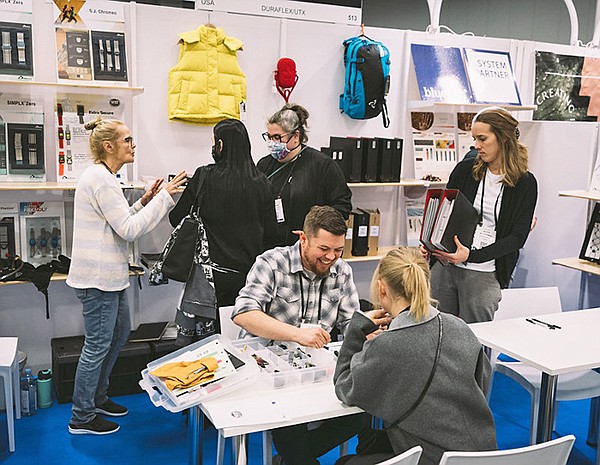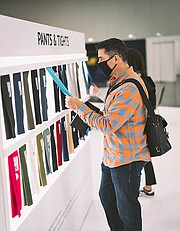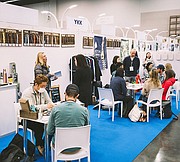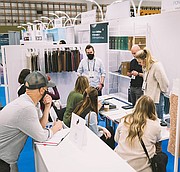The latest edition of Functional Fabric Fair, in Portland, Ore., provided an opportunity to source high-performance functional fabrics, finishes, trims and accessories for the outdoor, lifestyle and activewear industries.
TRADE SHOWS
Functional Fabric Fair Portland Brings New Features to Latest Edition
The spring edition of Functional Fabric Fair Portland—powered by Performance Days took place April 4–5 at the Oregon Convention Center in Portland, Ore., providing an opportunity for designers and brands to source high-performance functional fabrics, finishes, trims and accessories for the outdoor, lifestyle and activewear industries. Over 1,100 attendees were able to browse booths from over 80 exhibitors including Amaterrace, Ekoten, Cordura and 37.5.
“Functional Fabric Fair is focused on what I care about—not fancy booths or large-brand booths. They focus on making sure I have brands to show my fabrics to in an appropriate setting. The educational seminars certainly help bring in the brands and designers,” said Peter Lucier, sales executive at WidePlus International Co. Ltd.
New features at the show included an Outdoor Innovators Spotlight that highlighted pioneers in the outdoor industry, with Marmot, Moss Tents and Schoeller Textil USA, Inc. displaying some of their development notes. The show also partnered with Struktur to hold a full-day workshop that brought industry leaders together to discuss how to relaunch events and bring people together in a safe way as well as highlight the most future-focused ideas surrounding materials, technology and sustainability.
“This has been awesome! It’s great to get back out here and see all these great customers,” said Stephen Kerns, president of Schoeller. “We always enjoy coming to Functional Fabric Fair. It’s a very well-organized show. They do a great job of getting the messaging out of who’s going to be here, and we couldn’t be happier.”
On the attendee side, Tin York, material representative for Tinsellmat, LLC, said that “seeing all the vendors and looking for new trends and the presentations were very inspiring and insightful.”
Each Functional Fabric Fair features a focus topic that deals with a developing trend in functional fashion. The focus topic for this edition was carbon neutrality and what manufacturers should be doing in their production processes to help reduce emissions.
Steve McCullough, event director for Functional Fabric Fair, said the Portland show’s topic was organizing the industry and making sure there is a set standard for sustainability, with an end goal of having a carbon-footprint or carbon-emission stamp on every garment that allows consumers to see if a company is truly being sustainable or not.
“One of the highlights at the show is an area that we call the Forum, which is a group of highlighted fabrics in different categories from our exhibitors. We only choose fabrics that fall under certain criteria, and this one happened to deal with our focus topic. All our fabrics displayed in the Forum must be made with at least 51 percent recycled fabric. You can have the best soft-shell material in the world, but if you don’t use at least 51 percent recycled materials, we won’t even consider you,” said McCullough.
Although lightened restrictions have led to a return to in-person shows, Functional Fabric Fair as well as German partner Performance Days,which puts on a show in Munich, still make sure to involve digital aspects into their in-person shows. Both companies co-own a digital platform called The Loop, an online platform that connects the functional-fabric industry year-round.
“If you take part in either of our shows, you are automatically part of The Loop and you have a showroom and fabrics on The Loop. It has the same Forum as we do at our physical shows. And from The Loop, you can click on not only Forum fabrics but any fabric that any exhibitor has in their digital showroom and request a sample for free,” McCullough said.
“We put all of our content and all our focus topics from years and years ago until now. We have all of our speakers, presentations and Q&As, whether they were in Portland or Munich. It’s a treasure trove of information, and you can almost design your entire line just sitting at your desk.”
McCullough also noted that the lines between function and fashion are blurred now, with consumers not wanting to wear clothes that don’t offer some sort of performance value to them. Performance wear is beginning to become more readily available in standard, everyday clothing as opposed to specialty pieces.
“As a consumer, you don’t want to wear something that doesn’t do anything. I don’t buy Levi’s jeans that don’t stretch. Maybe 20 years ago Levi’s didn’t have any stretch; they were 100 percent cotton. Levi’s jeans I wear now have 5 percent spandex,” McCullough said.
Photos courtesy of Functional Fabric Fair.

























